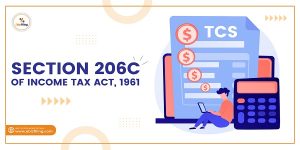“Explore the transformative impact of Section 206C (1H) in the Income Tax Act, 1961, regulating Tax Collected at Source (TCS) on goods sales. Delve into eligibility criteria, TCS rates, stakeholder definitions, and filing due dates to navigate this regulatory landscape effectively.”
The financial landscape underwent a significant transformation with the introduction of Section 206C (1H) in the Finance Bill 2020. This pivotal amendment underscores the government’s commitment to regulating Tax Collected at Source (TCS) in transactions involving the sale of goods. Specifically, if a seller’s total sales value surpasses INR 50,00,000 within a fiscal year, TCS becomes a mandatory obligation for the seller. This article navigates through the intricate details of Section 206C, encompassing eligibility prerequisites, submission deadlines for TCS, and an in-depth exploration of Section 206 within the framework of the Income Tax Act.
Page Contents
Section 206C of the Income Tax Act, 1961: Unveiling the Framework
The dynamic landscape of the Income Tax Act, 1961 witnessed a significant augmentation through the Finance Act of 2020, wherein the government of India introduced Section 206C (1H). This newly enshrined section intricately governs the rules of Tax Collected at Source (TCS) pertinent to sellers of goods. It mandates that if a seller receives an aggregate sum exceeding INR 50 lakh from a single buyer in a fiscal year, TCS collection becomes imperative if the seller’s total turnover surpasses INR 10 crore. Crucially, the TCS is to be remitted at the time of receiving payment.
Understanding the Stakeholders: Seller and Buyer Defined
A. The Income Tax Act delineates a seller as an entity encompassing the National Government, federal, state, or municipal governments, legally constituted businesses, state governments, cooperative societies, corporations, firms, Hindu Undivided Families (HUFs), or individuals whose accounts undergo tax audits under Section 44AB.
B. The term “buyer,” as per Section 206C, encompasses any individual with the right to purchase a product through various means, excluding specific entities such as public sector companies, government bodies, foreign embassies, and buyers acquiring products for personal use through retail sales.

Eligibility criteria within Section 206C of TCS encompass:
- Applicability to sellers with a total revenue exceeding Rs. 10 crore in the fiscal year before the sale.
- Exclusion of goods falling under specified sections such as 206C(1) and 206C(1F) to 206C(1G).
- Exemption from TCS if the buyer is a government entity or if TDS is already deducted by the buyer as per other provisions of the Income Tax Act.
- Non-applicability to imported goods into India.
TCS Rates under Section 206: A Comprehensive Overview
Section 206 designates specific goods and their corresponding tax rates:
- Timber under a forest lease: 2.5% tax rate.
- Tendu leaves: 5% tax rate.
- Scrap: 1% tax rate.
- Alcohol for human consumption: 1% tax rate.
- Timber not under a forest lease: 2.5% tax rate.
- Minerals (coal, lignite, iron ore): 1% tax rate.
- Forest produce (excluding tendu leaves and timber): 2.5% tax rate.
Note: Goods procured by an Indian resident for manufacturing purposes, as opposed to trading, are exempt from tax under Section 206C, with buyers required to file an application within 7 days of sale completion.
Due Dates for TCS Quarterly Filing
Compliance with TCS filing requirements involves adherence to quarterly due dates:
- Quarter April 1 to June 30: July 15.
- Quarter July 1 to August 30: October 15.
- Quarter October 1 to December 30: January 15.
- Quarter January 1 to March 30: May 15.
Conclusion
Section 206C of the Income Tax Act, 1961 imposes a tax collection obligation on sellers whose aggregate sales exceed INR 50,00,000 in a fiscal year. This provision ensures the government receives due taxes on high-value transactions involving the sale of goods. Limited goods and services fall under this taxation ambit, and sellers engaging in transactions above INR 50 lakh must collect TCS at a rate of 0.075%. Timely submission of TCS to the government is crucial to evade penalties and interest. This regulatory framework aligns with the broader fiscal goals and governance initiatives of the Indian government.





